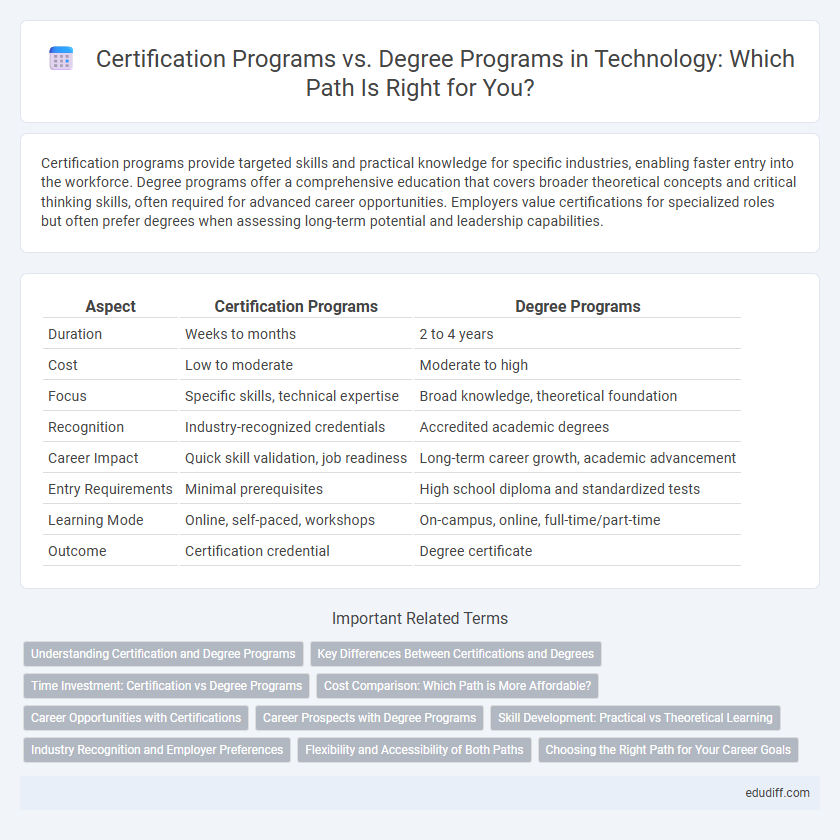Certification programs provide targeted skills and practical knowledge for specific industries, enabling faster entry into the workforce. Degree programs offer a comprehensive education that covers broader theoretical concepts and critical thinking skills, often required for advanced career opportunities. Employers value certifications for specialized roles but often prefer degrees when assessing long-term potential and leadership capabilities.
Table of Comparison
| Aspect | Certification Programs | Degree Programs |
|---|---|---|
| Duration | Weeks to months | 2 to 4 years |
| Cost | Low to moderate | Moderate to high |
| Focus | Specific skills, technical expertise | Broad knowledge, theoretical foundation |
| Recognition | Industry-recognized credentials | Accredited academic degrees |
| Career Impact | Quick skill validation, job readiness | Long-term career growth, academic advancement |
| Entry Requirements | Minimal prerequisites | High school diploma and standardized tests |
| Learning Mode | Online, self-paced, workshops | On-campus, online, full-time/part-time |
| Outcome | Certification credential | Degree certificate |
Understanding Certification and Degree Programs
Certification programs offer specialized, skill-based training that is often shorter in duration and focused on practical expertise in specific technologies or methodologies. Degree programs provide comprehensive, theoretical education over several years, encompassing broader academic knowledge and critical thinking skills in a given field. Understanding the distinct objectives and outcomes of certification versus degree programs enables informed decision-making aligned with career goals and industry requirements.
Key Differences Between Certifications and Degrees
Certification programs provide specialized, skill-focused training and demonstrate proficiency in specific technologies or methodologies, often with shorter completion times and industry-recognized credentials. Degree programs offer comprehensive academic education across broader subject areas, typically requiring multiple years and culminating in diplomas such as associate, bachelor's, or master's degrees. Employers often value degrees for foundational knowledge and analytical skills, while certifications are preferred for validating up-to-date technical expertise and practical capabilities in niche fields.
Time Investment: Certification vs Degree Programs
Certification programs typically require a shorter time investment, ranging from a few weeks to several months, making them ideal for professionals seeking rapid skill acquisition or career shifts. Degree programs generally demand multiple years of full-time study, often spanning two to four years, providing comprehensive theoretical and practical knowledge. Employers increasingly value certification programs for timely skill validation, while degree programs remain essential for foundational expertise and advanced career paths.
Cost Comparison: Which Path is More Affordable?
Certification programs typically offer a more affordable pathway than degree programs, with costs ranging from a few hundred to several thousand dollars, compared to degree programs which often require tens of thousands of dollars in tuition and fees. Shorter duration and fewer associated expenses such as textbooks, housing, and transportation contribute to the lower overall cost of certifications. Employers increasingly recognize industry-specific certifications for skill validation, making them cost-effective alternatives for career advancement in technical fields.
Career Opportunities with Certifications
Certification programs offer targeted skill development and faster entry into specialized career fields compared to traditional degree programs. Employers often prioritize certifications like CompTIA, PMP, or Cisco for roles in IT, project management, and networking, enhancing job market competitiveness. Certifications also provide continuous learning and upskilling opportunities aligned with evolving industry standards, driving career advancement.
Career Prospects with Degree Programs
Degree programs typically provide a comprehensive foundation in theory and practical skills, enhancing eligibility for a wide range of career opportunities in fields such as engineering, healthcare, and information technology. Employers often prefer candidates with degrees due to accredited curricula and extensive academic training, which can lead to higher starting salaries and leadership roles. Graduates from degree programs also benefit from professional networking, internships, and alumni resources that significantly improve long-term career prospects.
Skill Development: Practical vs Theoretical Learning
Certification programs emphasize hands-on, practical skill development tailored to specific technologies or job roles, enabling rapid application in professional settings. Degree programs provide a comprehensive theoretical foundation, fostering critical thinking and a deep understanding of principles across broader subject areas. Both approaches complement each other by balancing immediate workforce readiness with long-term intellectual growth in technical fields.
Industry Recognition and Employer Preferences
Certification programs offer specialized, up-to-date skills that align closely with industry standards, making them highly recognized by employers in rapidly evolving technical fields. Degree programs provide comprehensive theoretical knowledge and foundational concepts valued for long-term career development and leadership roles. Employers often prefer certifications for immediate job readiness and specific technical expertise, while degrees are favored for roles requiring broad analytical skills and career advancement potential.
Flexibility and Accessibility of Both Paths
Certification programs offer greater flexibility and accessibility by providing shorter, more focused courses that can be completed online or part-time, appealing to working professionals and those seeking rapid skill acquisition. Degree programs typically require a longer, more structured commitment with full-time study and on-campus attendance, which may limit accessibility for individuals balancing work or personal obligations. Online degree options have begun to improve accessibility, but certification programs remain the preferred path for those needing adaptable schedules and immediate industry-relevant credentials.
Choosing the Right Path for Your Career Goals
Certification programs provide specialized skills and industry-recognized credentials ideal for professionals seeking rapid entry or advancement in specific technical fields. Degree programs offer comprehensive knowledge and foundational theory essential for long-term career growth and opportunities in research or management roles. Evaluating your career objectives, time commitment, and desired expertise helps determine whether a targeted certification or a broad academic degree aligns best with your professional development.
Certification Programs vs Degree Programs Infographic

 edudiff.com
edudiff.com